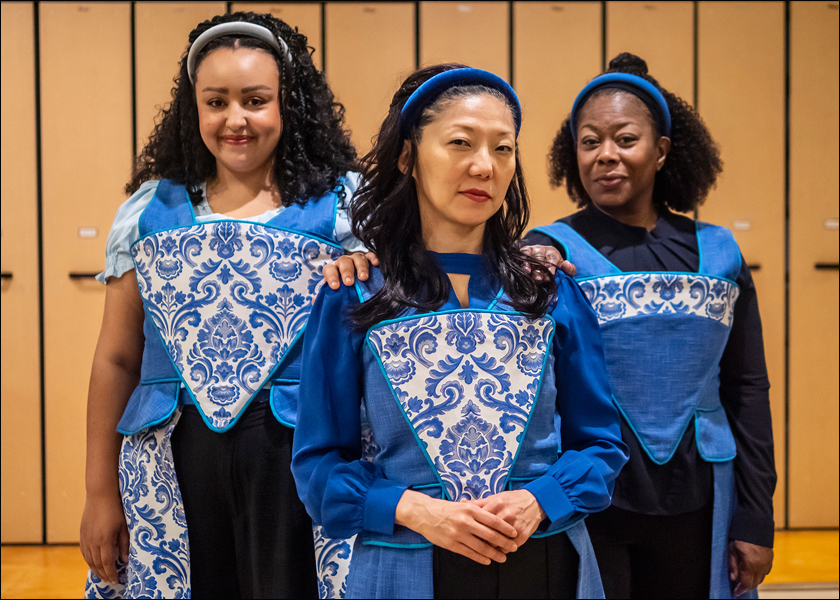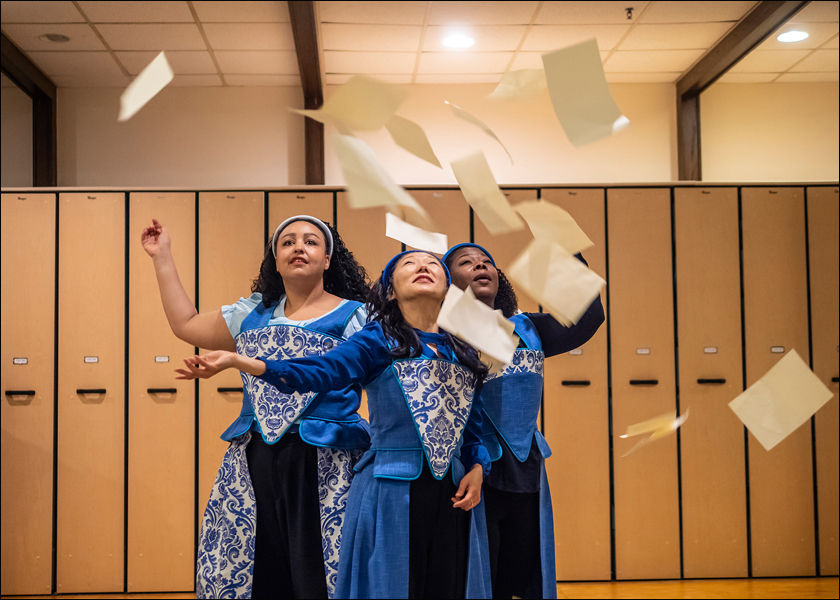Emilia celebrates women artists in history who struggled to be heard | By Anne Holzman (Spring 2023)

Emilia by Morgan Lloyd Malcolm, Ten Thousand Things, producer
(Directed by Marcela Lorca, Open Book, Minneapolis, and other community locations, through June 11, 2023)
What’s that, you say? An evening of storytelling with some of the Twin Cities’ finest actors, in this case all women, in a vintage high school gymnasium with an appreciative crowd that got in for free?
Yes, please!
Even better: A clever script yanking on memories of well-worn plays, twisting them like so much laundry and wringing out laughter and tears, and the amazement of sitting four feet from Greta Oglesby as she narrates this story in a voice that bounces off the basketball backboards with ease.
Not to mention the side-eye from actor (and Korean adoptee) Sun Mee Chomet as she grunts and strides and transforms her small frame with hockey-player braggadocio; and the hilarity of Kimberley Richardson in her role, high kicking, squealing and mugging in every direction at once. There is also Mo Perry puffing out her cheeks and snorting the lines of an aging sexist aristocrat, and Marisa Tejeda’s divine chanting and regal bearing as the younger Emilia.
There is also George Keller’s quick transformations of manner and voice, Sophina Saggau doing body bumps off her teammates, and Maggie Chestovich contorting a comic face that must be made of Silly Putty, then holding the room’s whole collective breath through a brave woman’s silent suffering.

Yes, to Emilia, produced byTen Thousand Things, and directed with characteristic brilliance by Marcela Lorca with a star-studded cast. The brilliant cast is all women (to make up for all those years when the Globe Theater, where Shakespeare staged his plays, could only allow men to be actors). Yes to a theater company that gives us this fresh new look at where our theater traditions come from and the many that this tradition has left behind.
Written by Morgan Lloyd Malcolm, Emilia tells the story – with considerable imaginative embroidery – of Aemilia Bassano Lanyer (or Lanier), a poet of early 17th century England who, in spite of many headwinds as a woman of modest means, managed to publish a book of poetry and prose. The play picks up on the unproven theory that she became Shakespeare’s lover and inspired his references in sonnets to a “Dark Lady.” This reference is thought to be about Lanyer because the Bassano family was of southern European origin and likely Jewish.
Three of Shakespeare’s plays have characters named Emilia, and there is a Bassanio in Merchant of Venice, but the evidence for more than a passing connection between Lanyer and Shakespeare is scant. That said, there’s no denying the achievements of Lanyer’s surviving work and the historical barriers for women to publish literature using their own names. Emilia is fiction, but it’s also a whopping load of truth.
Emilia premiered in London in 2018 and won three Olivier awards in 2019, including Best Comedy.
In this script, the playwright exploits language differences across the centuries not only for comic effect, but to remind us that Emilia’s voice can be heard now in a way that was not possible during her lifetime. The actors deliver many lines in Elizabethan language but break to a line like Alfonso’s exit shot: “That would’ve been a massive drag, hmm?”
Echoing across the centuries are the many references to the ongoing struggles of women (“We merely ask for them to let us join”) and controversies over intellectual property (“No one owns words”). Beneath all the hilarity and fury of this script lie carefully constructed themes of authorship and authority that should keep the story fresh for generations.
The play follows conventions familiar in Shakespeare plays, including the use of a few actors to cover multiple roles and the nudging and winking that comes with actors impersonating the opposite sex. There is even a scene set at the Globe Theatre, the original venue for most of Shakespeare’s work, in which Emilia recognizes her own words in the mouths of actors and begins to shout over them, producing a strangely operatic effect of layered voices.
Audiences of Ten Thousand Things productions can count on becoming part of the action. The company sets up each performance space with a stage area surrounded by about a hundred folding chairs, arranged two rows deep around a square; actors enter and exit at the square’s corners and get their costumes from racks at the edges of the room. Occasionally an actor will briefly take a seat in the audience. Two characters in conflict sometimes circle the stage as in a boxing ring, using hand gestures to gin up excitement in the crowd. Toward the end of Emilia as the poet’s work finally begins to be published, the actors distribute poetry broadsides to the audience bearing lines by Aemilia Lanyer in a cursive font. Throughout the play, characters seek allies and start debates with audience members, adding to the fun and keeping us alert lest we be their next target.
Ten Thousand Things performs for paying audiences at Open Book in Minneapolis, where the show runs through June 11. The company also performs in community locations including parks, schools and prisons, some of them open to the public. The show at Patrick Henry High School was hosted by Project Success, which connects high school students with theater and other opportunities.
More info on Aemilia Bassano Lanyer can be found at: https://www.poetryfoundation.org/poets/aemilia-lanyer


